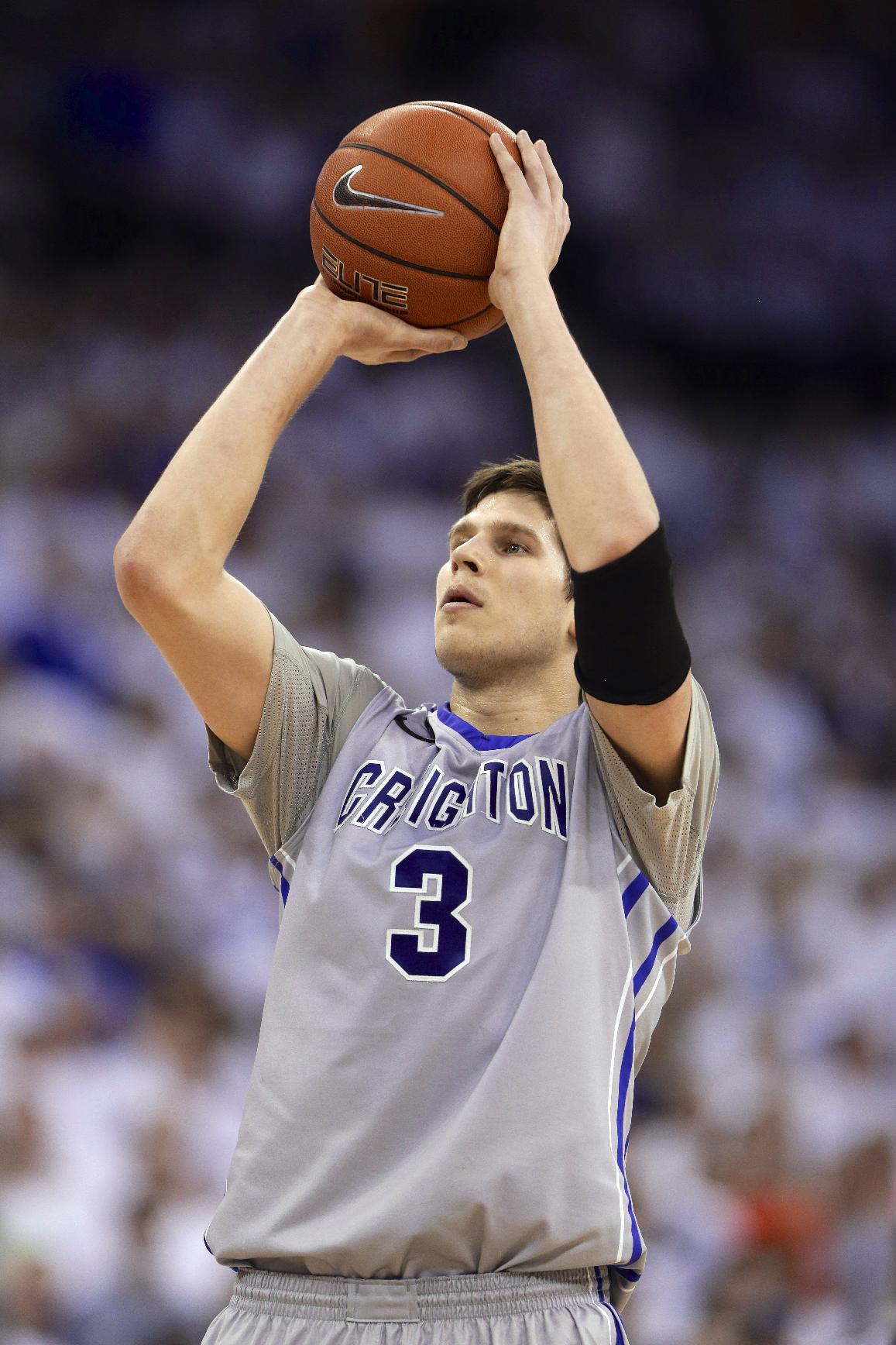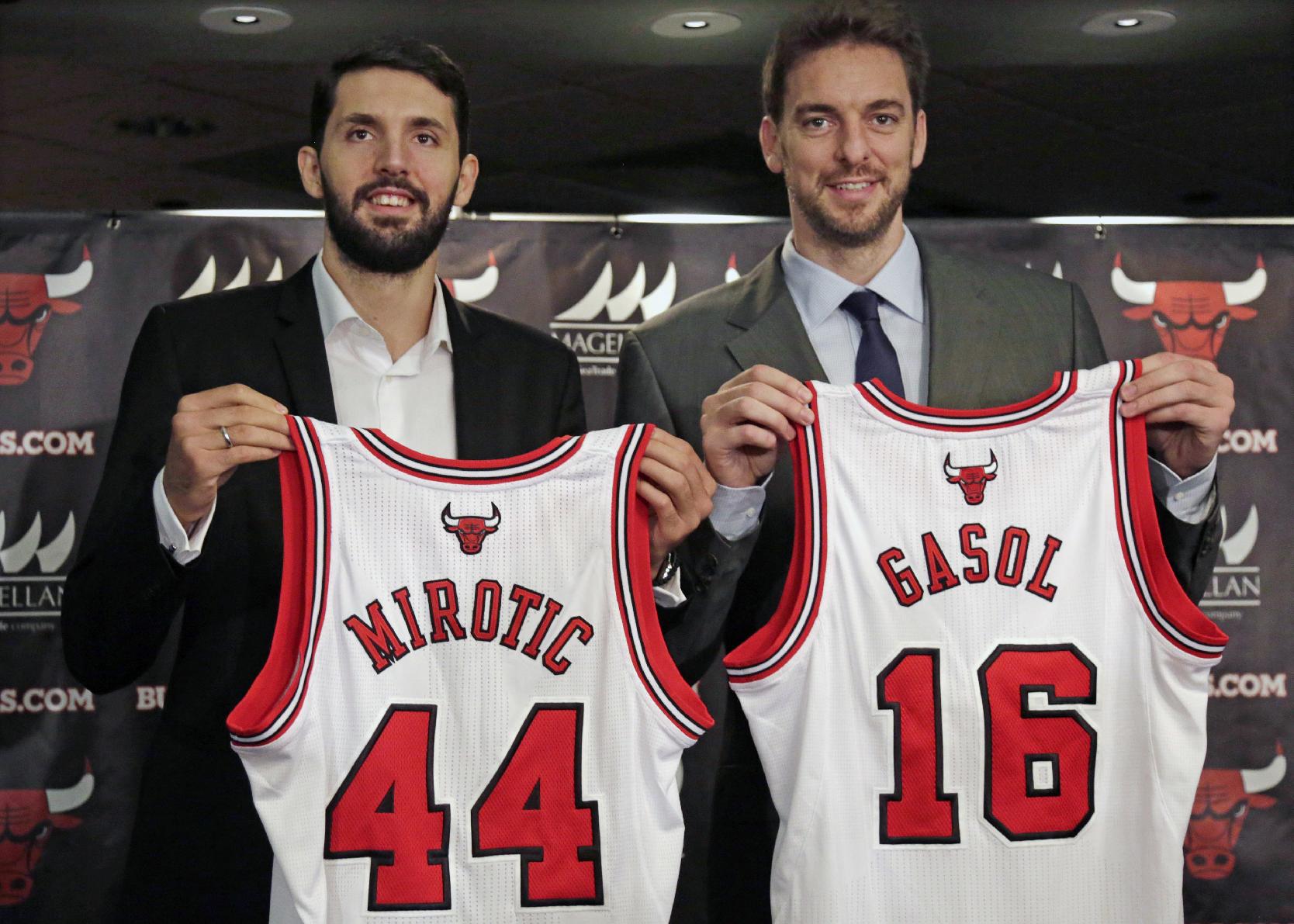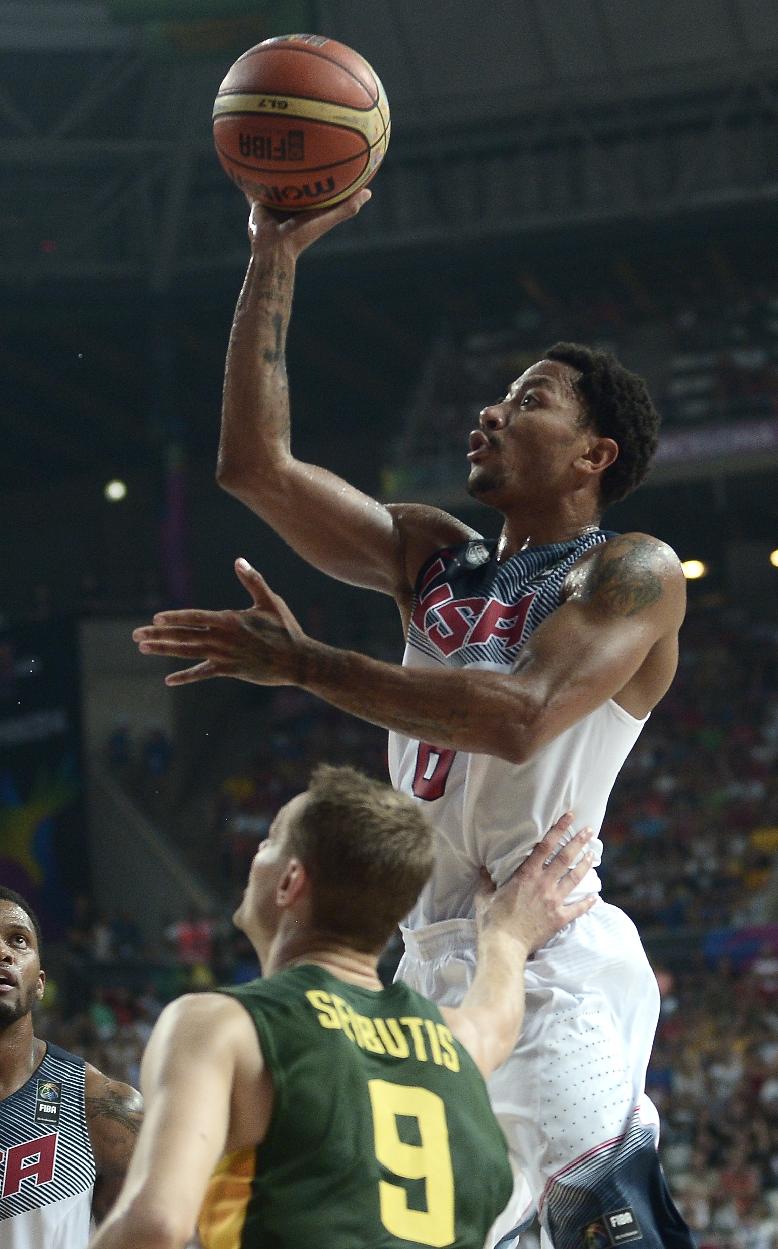BDL’s 2014-15 NBA Season Previews: Chicago Bulls
Every year, as the injuries pile up, Tom Thibodeau invokes the mantra: “We have enough to win.” This time, that might actually be true.
After grinding out a first-round win before a gentleman’s sweep in Round 2 without their leader, the Chicago Bulls entered the 2013-14 season hoping for a return to prominence helmed by Derrick Rose, finally healthy following his April 2012 left ACL tear. Just 10 games later, though, Rose was back on the shelf after tearing the meniscus in his right knee, and Thibodeau was back to scratching out wins one stop at a time.
The Bulls did, of course, because that’s what they do. They play five-men-on-a-string defense, smothering pick-and-rolls and making you do things you don’t want to do. They finished second in the league in defensive efficiency, allowing a miserly 97.8 points per 100 possessions, despite trading away longtime talisman Luol Deng midseason, and despite playing Carlos Boozer and D.J. Augustin for nearly 4,000 combined minutes.
That happened because the Bulls employ Joakim Noah, the Defensive Player of the Year, and Taj Gibson, whom some thought defended even better than Noah, and Jimmy Butler, who’s become a premier wing stopper. And, of course, because of Thibodeau, whose strong-side overload zone is the gold standard of NBA defense, and whose coaching has coaxed career-best work out of many lightly regarded defenders.
Without Rose to run the offense, Chicago relied heavily on Noah as a high-post initiator. He responded by averaging a team-high 5.4 assists per game, by leading all NBA bigs with 12.3 points created via assist per game, and by becoming just the fifth player 6-foot-10 or taller to assist on more than a quarter of his teammates’ baskets, according to Basketball-Reference.com. Whether picking out cutters or running the break, Noah helped conjure enough points to win 48 games; combined with his stellar defense, it was enough to earn him a fourth-place finish in MVP voting.
It wasn’t, however, enough to get past the resurgent Washington Wizards in Round 1. Randy Wittman’s club bullied the Bulls from the jump, taking the first two games at United Center en route to a five-game wipeout that sent Chicago into another uncertain offseason.
The Bulls seem to have handled their business this summer, putting together what Rose called the most talented roster he’s had in Chicago, and the former MVP says he’s ready to roll again after another year spent rehabbing. With one longtime nemesis on the downturn and another on the rise, can a more potent Bulls team vault back into the NBA’s elite? Or will this year’s bid for a return to glory fall short, too?
2013-14 season in 140 characters or less:
Hey, Derrick’s ba—nevermind. We can’t score but neither can you. Noah runs point, wins DPoY. DJ Augustin! 48 wins, but smothered in Round 1.
Did the summer help at all?
Yes. After struggling to score without Rose for the past two seasons — they finished 24th among 30 NBA teams in points scored per possession in 2012-13, and tied for 27th last year, according to NBA.com’s stat tool — they needed to add some offensive firepower to their perpetually near-perfect defense. By the looks of things, they succeeded.
They started by sending the rights to their two 2014 first-round picks, Bosnian center Jusuf Nurkic and Michigan State guard Gary Harris, and a 2015 second-rounder to the Denver Nuggets for Doug McDermott. The Creighton sniper led the NCAA in scoring last season, earning National Player of the Year honors, and shot a blistering 45.8 percent from 3-point range during four years on campus. The three-time first-team All-American ought to offer some additional punch to a Chicago team that ranked dead last in the NBA in field-goal percentage and 24th in 3-point accuracy last season.
But one rookie does not an offseason make, and Chicago also had its sights set on landing upgrades with money saved by jettisoning the non-crunch-time-playing Boozer via amnesty. Carmelo Anthony might have been their top choice, but when the New York Knicks backed up the Brinks truck to keep ‘Melo in Manhattan, the Bulls bounced back by bringing in both Pau Gasol and Nikola Mirotic, a 2011 draftee who starred for Real Madrid of Spain’s ACB for the past few seasons, on three-year deals.
The backcourt signings — spirit animal/perpetual bruise Kirk Hinrich, veterans Aaron Brooks and E’Twaun Moore — won’t blow anyone’s hair back, but if the team’s biggest question gets answered in the affirmative, they won’t need to. Rose went through a full Team USA training camp and played in all nine games for the eventual gold-medal winners during the 2014 FIBA World Cup in Spain, and while he did so without much distinction — 4.8 points and 3.1 assists per game on rancid 25.4 percent shooting — he also did so without incident or injury. That alone makes this summer a winner for the Bulls, right?
Go-to offseason acquisition:
I’ll cheat and go two-for-one with Gasol and Mirotic. Neither the former Los Angeles Lakers pivot nor the 23-year-old European forward approximate Anthony’s scoring skill, but together, they represent a significant offensive upgrade at the four spot and give the Bulls one of the NBA’s deepest frontcourts.
Gasol’s post prowess and interior passing should pair beautifully with Noah’s facilitating, especially if Pau can build off his strong summer play for Spain at the World Cup, where he averaged 20 points in 27 minutes per game on 63.5 percent shooting. The 6-foot-10 Mirotic will likely experience some growing pains in his first NBA season, but his perimeter shooting and scoring touch, detailed in this DraftExpress scouting video, gives Thibodeau a stretch four whom opponents will have to respect out to the arc. That should open up more driving lanes for Chicago’s guards and provide increased playmaking room on the inside.
If Gasol’s energized by a fresh start after an often-frustrating end to his time in L.A., Mirotic can get acclimated to the NBA quickly and McDermott’s strong Summer League play — 18 points, four rebounds and 2.8 assists in 28.8 minutes per game, 44.4 percent from 3 — carries over, they should give Chicago’s offense a greater level of creativity and versatility than it’s had in years, all for about two-thirds of Anthony’s annual rate. With Noah and Gibson already on board and veteran Nazr Mohammed back to set screens and spell Noah, the Bulls’ frontcourt looks very capable of both creating their own opportunities and taking advantages of those created for them.
Glaring weakness:
While Gasol gives Thibodeau another frontcourt initiator, and McDermott and Mirotic look to be able to stretch defenses, Chicago still seems thin on dynamic creators.
For all his grit and all the equity he’s built with Thibodeau over the years, Hinrich’s just not quick enough at this stage to break down many defenders; he’s a capable reserve guard whose warts get magnified when he’s forced into a larger role. The 29-year-old Brooks profiles as this year’s undersized reserve gunner — by now, a time-honored tradition for Thibodeau teams — with the burst to get to the basket and a solid shooting touch (he’s shot league-average or better from 3 in four of his six NBA seasons). But with the exception of his Most Improved Player-winning 2009-10 season with the Houston Rockets, Brooks has never been a reliable big-minutes solution, and he’s much more of a creator for himself than for others.
A lack of playmaking off the bench feels like a bigger concern for Chicago than it might be for other teams due to the somewhat tenuous nature of Rose’s return and the lack of a reliable scorer at the two, where neither Butler nor Tony Snell are yet the kind of players who scare defenses with the ball in their hands. If Rose can’t shoulder the playmaking load for any reason, the Bulls could again struggle to score against top defenses.
Contributor with something to prove:
Rose. It’s one of the biggest questions in the league: Can Rose can get back to being the go-go engine of Thibodeau’s offense, whose explosive forays to the rim break down defenses? Rose’s gift for getting to the basket and finding teammates can transform Chicago from a one-sided team that fades against top-flight competition into an all-around squad that can beat the very best … but he’s got to prove he’s still that guy.
The last time the Bulls had Rose for a full season, in 2010-11, they finished 12th in offensive efficiency, scoring an average of 105.5 points per 100 possessions; Rose averaged 25 points and 7.7 assists per game and won the league’s Most Valuable Player award. The last time they had him for more than half the season, in the lockout-shortened 2011-12, they finished fifth in points per possession; Rose dished dimes on more than 40 percent of his teammates’ baskets, the NBA’s seventh-best assist rate. Without him these past two years … well, Chicago’s been dismal, despite Thibodeau getting better-than-expected work out of reserves Hinrich, Augustin and Nate Robinson.
He’ll have the re-signed Hinrich and veteran Brooks to run the show if Rose can’t go this time around, but for the Bulls to get where they want to be — back to winning 75 percent of their games, back in the mix for the East’s top spot, back to the brand of ball that can kick LeBron’s ass — they need Rose to play like the reckless-abandon MVP he once was. He never quite looked like that guy during his 10 pre-injury games last season, and scarcely resembled him during his Team USA turn.
The glass-half-full position on Rose suggests you can’t take too much away from the summer. After all, he didn’t exactly light the world on fire during the 2010 FIBA World Championship, but went on to become the youngest MVP in NBA history the following season, and he looked fantastic last preseason before playing poorly once live action started. Viewed through that lens, Rose’s unimpressive World Cup seems less important than the fact that he feels like his body’s accustomed to basketball again.
Whatever lens you use, though, it’s still two and a half years and two major knee injuries since Rose last played at his peak, and he has to prove that he can be a top scorer and table-setter again. If he can, the Bulls can contend for a championship. If he can’t, they’ll again have a hard time getting past Round 1.
Potential breakout stud:
Butler. “Breakout” might be the wrong word here, because thanks to Thibs’ insistence on iron-man basketball and some high-profile matchups with LeBron James, we know what the 25-year-old Marquette product is capable of on the defensive end. So let’s call Butler a “breakthrough” candidate, then — if he can get his offensive game on track, he could join Paul George and Kawhi Leonard as one of the best two-way swingmen in the game.
Butler earned a spot in Thibs’ rotation with his defense and hustle as a sophomore, but he also showed a developing jumper, knocking down 38.1 percent of his 3-point tries during the 2012-13 season. The bulk of that work came on catch-and-shoot opportunities away from the play — 43 of Butler’s 55 made 3-pointers in ’12-’13 were spot-up looks, according to Synergy Sports Technology‘s game-charting, and he shot 38.4 percent on such shots. Last season, with injuries and ineffectiveness hampering the Bulls’ point guards, Butler handled the rock more often, orchestrating a higher share of Chicago’s possessions in the pick-and-roll while working less frequently as a spot-up option. Perhaps as a result of the necessity-based stretching of his game, his overall shooting accuracy cratered; Butler shot just 39.7 percent from the floor and 28.3 percent from 3.
Rose’s return means both that Butler won’t have to initiate offense as often, and that when he does get the ball with an opportunity to attack, he’ll more likely face defenses that have already been distorted by initial Rose-triggered action. It should also mean that he’ll get cleaner looks and that he’ll get them more often, which could help his shooting numbers bounce back. If Butler can resurrect his stroke, continue to refine his off-the-bounce game and maintain his elite defense, he could go from solid to star, and put himself in line for a hefty offer sheet in restricted free agency next summer. (If the Bulls don’t extend him before the Oct. 31 deadline, that is.)
Best-case scenario:
Rose gives Chicago the off-the-bounce lightning bolt they’ve sorely needed these past two years, creating easy transition points and drive-and-kick buckets. McDermott, Mirotic and Mike Dunleavy Jr. feast on those open looks, bumping the Bulls up to the middle of the pack in 3-point makes and percentage. Thibodeau creatively splits frontcourt minutes to keep his bigs fresh, allowing Gasol and Noah to make beautiful music, Mirotic to learn the ropes while paired with a defensive watchdog, and Gibson to put up another Sixth Man of the Year-worthy campaign. Butler and Tony Snell give Thibs a 3-and-D combo that can squash any perimeter threat, and the Bulls ride a top-five D and a top-10 O to the team’s first title since MJ left town.
If everything falls apart:
Rose can’t find his form, whether due to another injury, persistent mental blocks or an inability to alter his game to find ways to contribute without going 110 miles per hour. The minutes, miles and workload catch up with Noah, who’ll turn 30 just after the All-Star break, and his at-times-troubled feet. Gasol’s summertime spark dissipates in the States, he looks two steps slow at age 34, and he winds up providing less production than Boozer. McDermott and Mirotic struggle against NBA defenders and can’t defend well enough to stay on the floor. Neither Butler nor Snell take steps forward on the wing, as the Bulls miss Deng something fierce. Chicago tops out as a bottom-of-the-playoff-bracket squad that can’t score enough to pull an upset.
Kelly Dwyer’s Best Guess at a Record:
57-25, giving Chicago its seventh straight playoff berth and slotting them second in the East.
– – – – – – –
Dan Devine is an editor for Ball Don’t Lie on Yahoo Sports. Have a tip? Email him at devine@yahoo-inc.com or follow him on Twitter!
Stay connected with Ball Don’t Lie on Twitter @YahooBDL, “Like” BDL on Facebook and follow BDL’s Tumblr for year-round NBA talk, jokes and more.



